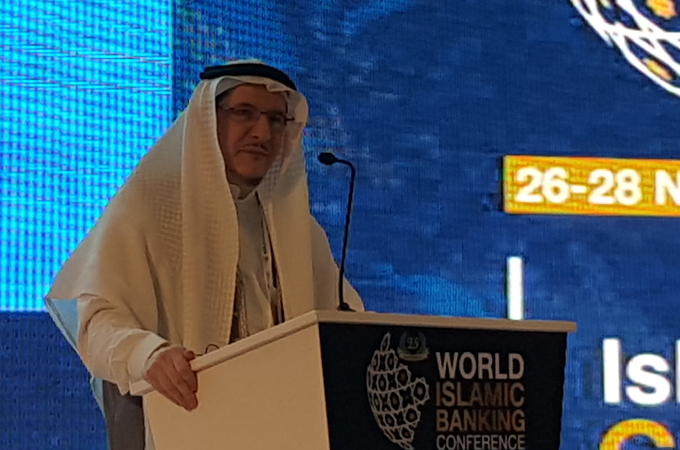
Dr Sami Al-Suwailem launching the report
Islamic finance can offer long-term development financing
MANAMA, November 27, 2018
By unleashing the potential of Islamic finance, much-needed funding could be harnessed for long-term development financing, a new report has said.
The second edition of the Global Report on Islamic Finance, published by the Islamic Research and Training Institute (IRTI) of the Islamic Development Bank (IsDB) Group, highlights steps for unleashing the potential of Islamic finance to help harness the funds for long-term investment in development programmes.
Subtitled “The Role of Islamic Finance in Financing Long-Term Investments”, the report was launched today by the acting director general of IRTI, Dr Sami Al-Suwailem, during the 25th World Islamic Banking Conference in Bahrain.
Following the launching, Dr Rami Abdelkafi gave a presentation on its key findings and recommendations.
The report presents global perspectives on the challenges of financing the 2030 global agenda for sustainable development and highlights the prospects of Islamic finance towards addressing the funding gap.
Development partners have identified that the scale of funding required to achieve sustainable development goes beyond the scope of traditional financing sources, underscoring the need to tap from alternative sources.
While private sector funds are available for investment, the report finds that these resources are mostly deployed in short-term instruments, largely because of the potential risk of investing on the long term. The annual long-term funding gap for the Sustainable Development Goals (SDGs) is estimated to be $2.4 trillion, even though $42 trillion is available in short-term funds with low or negative returns.
Islamic finance, which is based on the principles of risk sharing, addresses the risk element and therefore offers an alternative channel to mobilise long-term financing, it says.
The report notes that by unleashing the potential of Islamic finance, funding could be harnessed for programmes aimed to eradicate extreme poverty, develop infrastructure, provide education, ensure access to clean water, and fight climate change. It, therefore, proposes incentivising risk sharing and asset-backed finance as the potential mechanism to attract financing for long-term investments.
However, the report finds that in order to optimally tap the potential of Islamic finance in this regard, there is the need to develop the enabling legal, regulatory, and financial ecosystem.
The report made two major recommendations, namely to strengthen the financial system through developing the regulatory environment, and to enhance the institutional framework and diversity of instruments for long-term financing.
The series of Global Reports on Islamic Finance was launched in 2016 as a joint project of the IsDB Group, represented by IRTI, and the World Bank Group. An abridged version of the 2018 edition was presented back in April during the 43rd Annual Meeting of the IsDB Group in Tunis, Tunisia, while the full report was unveiled today.
The full report is available for download at: http://irti.org/English/Research/Documents/GRIF_2018.pdf







